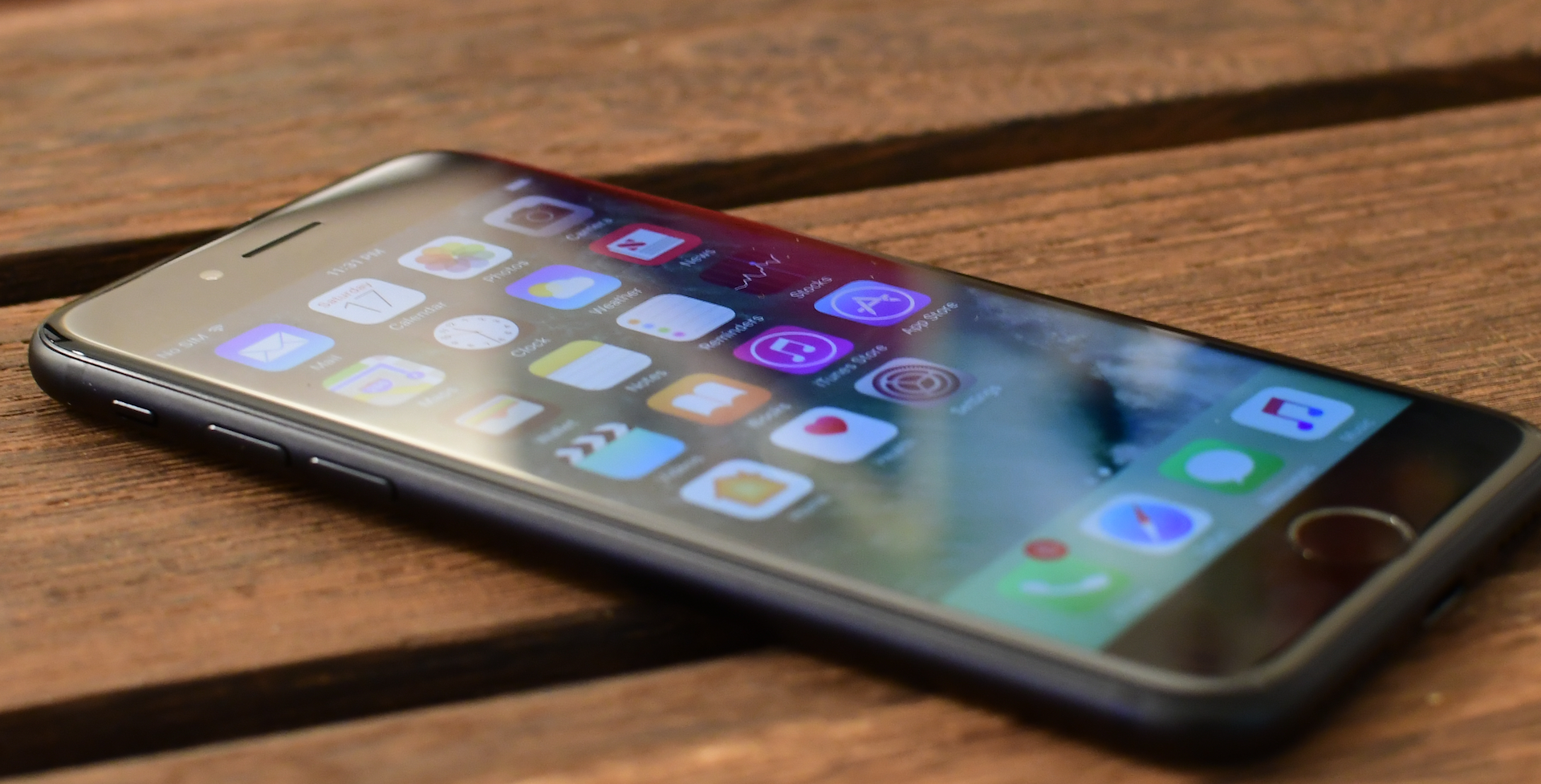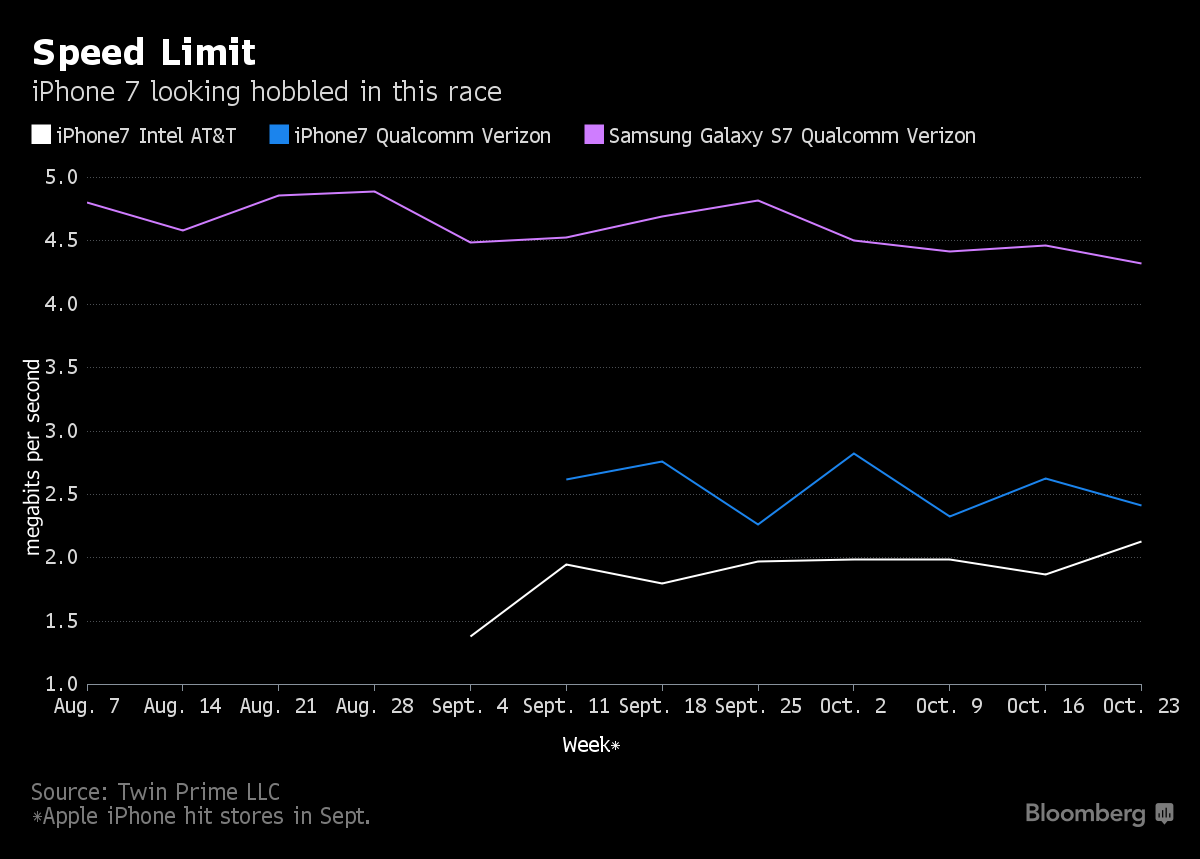Bloomberg today shared research conducted by Twin Prime and Cellular Insights in a story suggestively headlined “Apple’s Chip Choices May Leave Some iPhone Users in Slow Lane” which asserts Apple may have throttled LTE performance of the Verizon iPhone 7 handsets to make them perform about as well as the AT&T iPhone 7 models.
Apple in a statement shot down the report and denied throttling, insisting there’s “no discernible difference” in wireless performance between various iPhone 7 models.
Research is based on data from more than 100,000 smartphones downloading the same image in large U.S. cities. They ran the same tests on Verizon versions of the Galaxy S7 and the iPhone 7, both of which use Qualcomm’s X12 LTE modem chip.
Samsung’s phone was about twice as fast as the iPhone 7 running on the same network. Furthermore, the Verizon iPhone 7 was “a little faster” than its AT&T counterpart, but “not as fast as it could be.”
Twin Prime’s Gabriel Tavridis thinks that the Verizon iPhone 7 “is not taking advantage” of all of the carrier’s network capabilities, speculating that Apple “could have chosen to not enable certain features” of the Qualcomm chip.
Apple responded with a statement denying throttling Verizon iPhone 7 models:
Every iPhone 7 and iPhone 7 Plus meets or exceeds all of Apple’s wireless performance standards, quality metrics and reliability testing.
In all of our rigorous lab tests based on wireless industry standards, in thousands of hours of real-world field testing, and in extensive carrier partner testing, the data shows there is no discernible difference in the wireless performance of any of the models.
Some of the analysts contacted by Bloomberg suspect Apple may have restrained Verizon edition of the iPhone 7 to ensure a uniform experience across iPhone 7 models.
“They don’t want one version to get the reputation that it is better,” said Jackdaw Research’s Jan Dawson. “If Apple had a guiding principle it’s that they want to make sure customers were having a consistent performance.”
Unlike prior iPhones, the iPhone 7 uses dual-sourced Qualcomm/Intel modems.
Specifically, both “A1778” and “A1784“ models of the iPhone 7 use Intel’s LTE chip which supports AT&T and T-Mobile networks, but not CDMA networks used by Verizon, Sprint and a few other carriers. Qualcomm’s X12 chip, however, is the closest thing to a “worldphone” modem.
As a result, AT&T and T-Mobile GSM iPhone 7 models cannot be used on Verizon and Sprint’s CDMA network while the Verizon/Sprint iPhone 7 (model “A1660”) works on any of the four U.S. wireless networks.
The Qualcomm chip supports LTE speeds of up to 600Mb/s versus 450Mb/s for the Intel chip. Cellular Insights’ Milan Milanovic speculated that Apple didn’t enable a feature of the Qualcomm chip that uses more channels of data simultaneously than its Intel rival in order “to level the playing field between Qualcomm and Intel.”
Another analyst thinks Apple may have de-featured the Qualcomm modem because it would be difficult for them to explain to AT&T why Verizon is offering a superior product.
Is Apple really hobbling the Verizon iPhone 7 by not taking full advantage of the Qualcomm chip’s capabilities? And do they have some sort of incentive to balance the performance of iPhones across U.S. wireless carriers? Anything is possible, but the wording of Apple’s statement leaves little room for speculation.
Other network testing firms that Bloomberg contacted warn that many factors are at play when it comes to measuring LTE speeds reliably. It should also be noted that poor signal strength in areas of weak reception can significantly affect reported LTE speeds.
Then, there are differences in CDMA and GSM radio technologies used by Verizon and AT&T networks, for example. The Verizon iPhone was previously found to perform better in low-signal areas because faster low-signal transfer speeds let it maintain a stronger connection than its AT&T counterpart under similar conditions.
Source: Bloomberg

